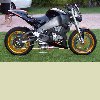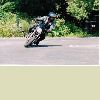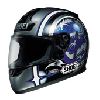| Author |
Message |
    
Trenchtractor

| | Posted on Thursday, January 06, 2005 - 08:19 am: | 




|
Here's a point...
The ZTL and perimeter disc set-ups also save weight by not requiring spokes for the disc.
Do you think the mass of one ZTL disc and lighter rim is going to be more stable at speed than two 320mm discs and the heavier rim that goes with it?? If so, by how much??
You could take the ZTL set-up including tyre, spin it and see how many kg's of force is required to turn it. Then spin a twin disc off an older model at the same speed and perform the same measurement...
I suspect the results would be very similar.
Also, I have an article that explains the different handling of a couple of the MotoGP bikes, and how the engine dynamics plays a huge role, and how an engine/chassis comination need to be built to compliment each other...
What I'm getting at is that if you were to stick a motor with lower reciprocating mass (say conventional) in the XB chassis, the thing would last about 5k's... The chassis is just far too aggressive.
Have you noticed that on a Buell you can pull up at a set of lights and not need to put your feet down?? Or that if you start to loose your ballance you can help maintain it if you blip the throttle?? The ZTL disc is doing stuff all for stability then since the bike is stopped...
A different example for you is the TTR600 thumper I used to have. One particular slow bit of hill side bush was difficult to negotiate, in second it was easier to control throttle (not spin up), in first it was easier to maintain balance... Just another bike with a huge reciprocating mass, gear selection would actually change stability charecteristics... The dirt based tyres and rims are a lot lighter than the road going counterparts so the engine has a greater effect. |
    
Blake
| | Posted on Thursday, January 06, 2005 - 09:51 am: | 




|
I don't believe that stability (as in resistance to violent oscillations like in a tank slapper scenario) figures prominently into the choice of ZTL or conventional brake.
The ZTL was chosen primarily to allow a significantly lighter wheel assembly and improved braking compared to a single conventional disk. |
    
Geoffg

| | Posted on Thursday, January 06, 2005 - 01:50 pm: | 




|
So, with regards to the single ZTL disc--I've read in one review, and heard rumours as well, that the single-sided nature of the Buell brakes causes the front forks to twist, inducing unwanted steering inputs. I don't believe this--but what've you guys got to say? |
    
M1combat

| | Posted on Thursday, January 06, 2005 - 02:26 pm: | 




|
Rubbish. It would have to twist the rim to do that. Specifically... It would have to twist the outer portion of the rim because the braking torque is ONLY applied from the mounting mechanisms outward to the tire. You can be sure that if a single disk setup would cause any turning force, that NO manufacturer would have even considered building any type of motorcycle with a single disk. Please smack anyone who tells you otherwise. |
    
Blake
| | Posted on Thursday, January 06, 2005 - 03:23 pm: | 




|
Do a free body diagram of the forces acting upon the wheel and front end assembly and you will see no resultant twisting force. Everything resolves right down the middle or is cancelled out by equal and opposite forces.
Who's going to do the FBD?  |
    
M1combat

| | Posted on Thursday, January 06, 2005 - 03:55 pm: | 




|
It's already done. Look at the 2nd or 3rd quarter Fuell magazine. |
    
Bomber

| | Posted on Thursday, January 06, 2005 - 04:09 pm: | 




|
Blake has a point -- most bikes try to stand up a bit under braking (some more than others, and tire choice affects this), and turning in while braking at the same time could certainly affect the feel of the turn-in -- with the input into the master cylinder identical, I believe the braking forces generated by the large disk would be higher, thereby having a great affect on the tur-in
or did I get lost somewhere (not an engineer, after all ;-} ) |
    
Anonymous
| | Posted on Thursday, January 06, 2005 - 05:26 pm: | 




|
Guys,
Some of you are on the right track here. It is the entire system you need to look at, wheel, tire and rotor. Going from a single 240 with a carrier to a single 320, with it's much larger brake carrier included, both on the same wheel would make a difference. But compare the single carrier free rotor and torqueless spoke ZTL design with one having filled in spokes and dual 300mm rotors with carriers, and you'd be amazed what comes up.
In addition you get all the advantages in the dramatic loss of steer axis rotational inertia, total vehicle mass centralization improvement, and dramatic improvements in translational inertia.
I'll leave it to Blake to explain this in mnore detail...he's really good! Free body diagram...would be neat if Motorcyclist magazine writers actually knew what one of those was, wouldn't it?
And, in case you haven't gleaned this from the above, a conventional wheel with dual perimeter brakes does NOT give you any of the advantages!
BTW, to anyone who claims the single disc won't work in racing, you should have been at the FX races last year. The racing Buells ran the ZTL system and had spectacular brakes. Mike repeatedly outbraked the leaders with his bike, even though his bike was significantly heavier than those titanium and carbon fiber exotics he was against. Yes, he was right on the verge of brake fade, but so were his competitors! This is SERIOUS racing!
As far as brakes fading, they all do, and one of the issues is often the rider. I remember a Lightning series rider on an S1 in the early days coming over squaking about his brakes fading at Daytona.
I reminded him that Shawn Higbee was running over ten seconds a lap quicker with the same brakes on the same bike with no complaints, so perhaps he should use them less so they wouldn't overheat, and his lap times would get faster as well. I don't think he liked hearing that, but plenty of truth in that isn't there?
Another example of this last year was at Road America when Jake Zemke on his factory Honda Superbike was raging on Speedvision about his crappy brakes that almost killed him (dual radial Brembo works units) while he was trying to keep up with Miguel. On the same show, Miguel, who had won the race using the same brakes, was praising how great his bike was. I just had to laugh. Miguel was smoking Jake with smooth riding, and Jake was riding stupidly trying to catch him, getting all squirrely. Of course this was a "brake problem". |
    
Blake
| | Posted on Thursday, January 06, 2005 - 05:54 pm: | 




|
"Free body diagram...would be neat if Motorcyclist magazine writers actually knew what one of those was, wouldn't it?"
Careful Steve A. might hear you. Not sure if Kevin has that background or not, but man he sure does know some cool stuff about bikes. But YES, it is frustrating as heck to keep reading the same old subjective biased reporting on sport bikes. RRW usually does okay.
Your observations on varied braking performance amongst different riders with identical equipment reminds me about an argument with a naysayer who was deriding the stock brake of the tube frame models for its propensity to fade during street riding. That was right around the time I went from last on the grid to take fourth in the local CMRA thunderbike amateur race... using the stock front brake to pass coming into turns 3 and 6 mostly.
The only time I have had any kind of brake problem was when I tried a set of EBC Kevlar "Green" race pads. They immediately wore horribly wedge shaped, ate the rotor and instigated a terrible front end chatter. Since that near tragic adventure I use the stock pads and an EBC steel rotor. Works great for me.  Tell Zemke to come to OHR and I'll give him some schoolin'. Tell Zemke to come to OHR and I'll give him some schoolin'.  |
    
Cataract2
| | Posted on Thursday, January 06, 2005 - 07:38 pm: | 




|
I'm not to keen on everything technical here. (though given time I can learn.)
But, what is Free body diagram? |
    
Anonymous
| | Posted on Thursday, January 06, 2005 - 07:41 pm: | 




|
Blake,
I Capitalized Motorcyclist for a reason, so Steve A. and Kevin C, and many others are excluded! |
    
Trenchtractor

| | Posted on Thursday, January 06, 2005 - 08:41 pm: | 




|
'I don't believe that stability (as in resistance to violent oscillations like in a tank slapper scenario) figures prominently into the choice of ZTL or conventional brake.'
I know that, Nor do I... I feel it's the use of the HD Spory engine that gives the stability, not the ZTL set-up... That post wasn't directed to you Blake, more to the discussion.
'The ZTL was chosen primarily to allow a significantly lighter wheel assembly and improved braking compared to a single conventional disk.'
Also reduces overall unsprung mass improving road holding compared to a conventional twin disc... Something every motorcycle front end could do with.
Big thanks to Annon for kicking in... |
    
Davegess
| | Posted on Thursday, January 06, 2005 - 09:10 pm: | 




|
I may be way off here 'cause my engineering knowledge is very much self taught but it seems to me that a gyro would have a more pronoouced gyro effect, I can spell them fancy centi... words, if the ratio of weight on the outside rim compared to the inside rim was increased. A bowling ball on a string will have more thana walnut on the same string.
The XB brake has to increase that ratio. I agree that tire is the most importatn part but that rotor being moved combined wiht the hub and spokes being lightened has to have a lot of effect.\
As far as the rear wheel goes you would need to mount the sprocket on the rim like the rotor is mounted otherwise you woul dnot be able to make a light hub and spoke. The main problem as I see it, aside from it might looking funky, is that you would need to rework the transmission give you an output shaft speed that woudl work with a gigantic rear sprocket. This might than cause problems with the actual design of the transmission.
I bet that if the XB success continues we might see a new transmsission supporting not only the ZTL brake and drive sprocket but increased smoothness in the shifting. The actual weight savings would be more than on the front end I bet. How's that for a wild guess. |
    
Ben_jamminvfcc
| | Posted on Thursday, January 06, 2005 - 09:48 pm: | 




|
Maybe a six speed tranny too!  |
    
Anonymous
| | Posted on Thursday, January 06, 2005 - 10:36 pm: | 




|
Dave,
Well you are wrong, so go back to photography!
Remember that everything rotating from the axle out counts towards inertia, so adding a little more on a larger radius, but taking away a lot at a slightly smaller radius balances out, or perhaps is even better.
A dual disc ISO brake set up with a conventional wheel has worse inertia than a dual disc conventional on the same wheel. But that's not what we have. The ZTL system has only one disc and super light spokes.
Now a single small conventional rotor mounted on a ZTL wheel would indeed have low inertia. However, while you were enjoying the quick turn-in, you would be balanced in the not-so-delightful world of wondering whether you were going to crash from not enough brake, or from the torsional loads ripping out the wheel spokes! |
    
Davegess
| | Posted on Thursday, January 06, 2005 - 10:57 pm: | 




|
Well you are wrong, so go back to photography!
LOL
Now you see why I don't design motorbikes!
Heck I can't even ride 'em fast!
All I kow htat my XB is so stable it is almost weird. Yet I go around corners way faster than I would have thought I would ever have and it never scares me. The thing just plain goes where I point it. And I know I am so far from the bikes ability that I just trust it.
(Message edited by davegess on January 06, 2005) |
    
Glitch

| | Posted on Friday, January 07, 2005 - 09:20 am: | 




|
All I kow htat my XB is so stable it is almost weird. Yet I go around corners way faster than I would have thought I would ever have and it never scares me. The thing just plain goes where I point it. And I know I am so far from the bikes ability that I just trust it.
Me too, I love how this bike has made me a better rider. I don't see how anyone reviewing motorcycles can say anything less. |
    
Davegess
| | Posted on Friday, January 07, 2005 - 10:18 am: | 




|
Man, I can't tpe. It doesn't help doing it in the dark 'cause the wife is asleep! |
    
Jlnance

| | Posted on Friday, January 07, 2005 - 01:13 pm: | 




|
But, what is Free body diagram?
It is a diagram used to analyize the forces acting on an object. You draw the object you are interested in, and you replace the parts holding the object in place with "force vectors," which is just a way to represent a force going in a particular direction.
http://www.glenbrook.k12.il.us/gbssci/phys/Class/newtlaws/u2l2c.html |
    
Cataract2
| | Posted on Friday, January 07, 2005 - 02:01 pm: | 




|
Ah, thanks Jlnance. Makes sense to me now. |
    
Blake
| | Posted on Saturday, January 08, 2005 - 12:10 am: | 




|
Physicists are goofy. I like to create my FBDs using representations of the actual object of interest. Here's some. Click on 'em if you are interested in perusing the discussions where they were originally posted. 


|
    
Ben_jamminvfcc
| | Posted on Saturday, January 08, 2005 - 10:08 am: | 




|
Blake, that was a great interactive FBD. Must have taken some time to work that together. |
    
Starter

| | Posted on Sunday, January 09, 2005 - 04:31 pm: | 




|
Could also have something to do with the use of only one blank to cut the front and back brake discs. There was a Yamaha 125GP bike running toward the back of the grid using a perimeter dsic brake last year. |
    
Blake
| | Posted on Monday, January 10, 2005 - 07:10 am: | 




|
Thanks Ben. There was a storied time in BadWeB history when I was able to find the spare time to actually contribute something meaningful to the site.  I do enjoy the technical stuff. I do enjoy the technical stuff. |
    
Ben_jamminvfcc

| | Posted on Monday, January 10, 2005 - 07:04 pm: | 




|
Beats administrative management, eh? |
    
Blake
| | Posted on Monday, January 10, 2005 - 08:52 pm: | 




|
You have no idea.  |
|